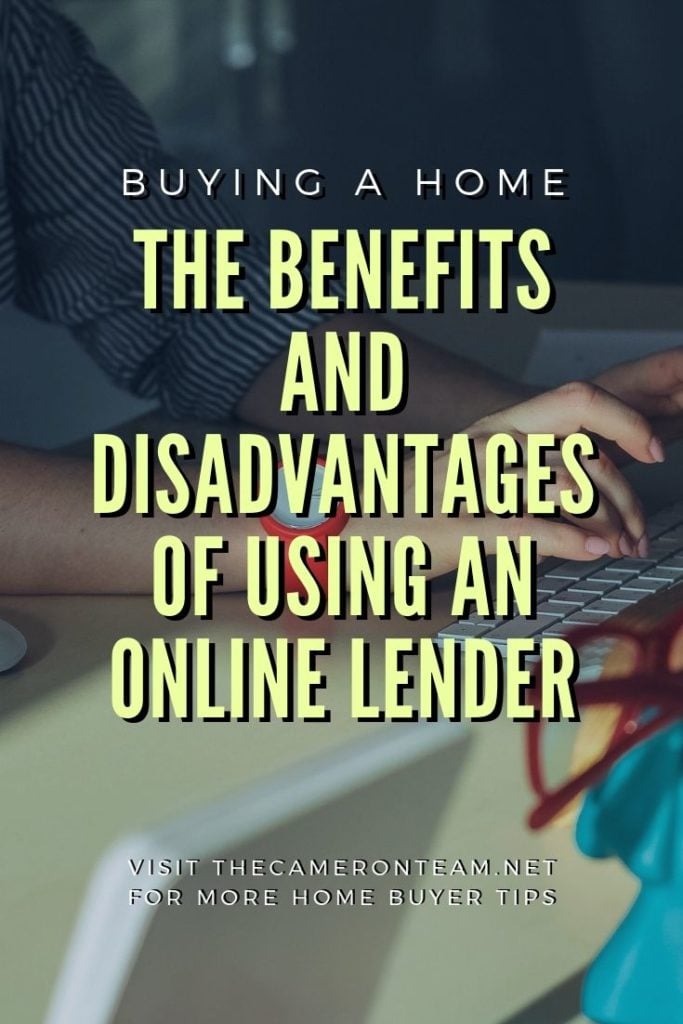Their commercials are all over television and streaming devices – online lenders advertising quick approvals and apps that make the application process super easy. The ease of accessibility appeals to home buyers who like the low-pressure benefits of shopping online and the swiftness of information retrieval. However, is there a benefit to using these online lenders and is their application system safe?
Home buyers will be happy to hear that online lenders are no more safe or unsafe than a local lender. Their application systems are encrypted to protect sensitive information from being accessed by outside parties, and they are subject to the same laws and protections enacted by The Consumer Financial Protection Bureau as other lenders. For borrowers looking beyond that, below is a list of benefits and disadvantages of using an online lender.
Benefits
1. The Application Process is Streamlined
Online lenders use state-of-the-art website and device applications to present and track the application process in a visually appealing way. It adds some transparency to the application process that many buyers, especially tech-savvy ones, appreciate. Plus, a 2018 study published by the Federal Reserve Bank of New York found that online lenders process mortgage applications about 20% faster than other lenders.
2. Multiple Rates Displayed at Once
Quicken Loans, Rocket Mortgage by Quicken, Lending Tree, Better.com, etc. are some of the more well-known names of online lenders. After the applicant answers a few questions, they display multiple loan packages and interest rates at once, so the buyer can see all their options in an easy-to-read interface. This is perfect for people who want to see side-by-side comparisons.
3. Opportunity for Lower Interest Rates and Fees
Online lenders rely heavily on technology to complete tasks, so they can reduce overhead costs that would normally be passed on to borrowers. As a result, there’s potential for the borrower to save money when purchasing a home. How much depends on the lender’s business model, but even a .25 interest rate savings could save a buyer thousands over the life of a 15-year loan. That could be more money put toward retirement, travelling, or the principal of the loan.
4. More Leniency
Because they aren’t banks, online lenders can be more lenient when qualifying borrowers and may be more likely to lend to someone with a lower credit score. However, this leniency can come with some sacrifices. People with lower credit scores usually pay higher interest rates and fees. However, if your credit score is borderline good, this is one way to guarantee you are approved.
Disadvantages
1. Hard to Get Ahold of a Real Person
If you don’t like waiting on hold to reach a customer service person, you likely won’t be happy when you call your online lender, because many can only be contacted through an 800 number. That doesn’t mean you won’t have to wait to speak to a traditional lender, as they have office hours and other clients; however, customer service tends to lean towards a certain standard. It’s also harder for your real estate agent to get updates and take actions that help keep a closing on track.
2. Less of a Personal Touch
Online mortgage lenders are less likely to give you personal attention. So, if you’re a first-time buyer or just someone who wants to be walked through every detail of the financial process, an online lender may not be the best match. Likewise, if you have a complicated financial situation (like self-employment), they may not have the time and resources to tailor a package to your needs, which is why online lending is best for people with a clear financial history.
3. Lack of Local Knowledge
Online lenders often advertise the power of national lending; however, local knowledge can benefit buyers, especially in coastal areas like where we live. Local mortgage lenders are educated on regional buyer assistance programs and requirements for specialized properties, like vacation rentals and beachfront properties. A North Carolina lender is more likely to understand the impacts of a hurricane than one based in Arizona. They’re also more likely to offer specialized loans for specific properties. These are things to keep in mind when choosing an online lender versus a local one.
4. Not a Good Resource for the Tech-Challenged
Applying for a loan online often requires borrowers to scan and upload forms to a dashboard. If you don’t have the equipment to do that or often find yourself having technical issues, you may prefer to use a lender with a local office. That way you can drop off the paperwork they need without the hassle of digitizing forms or mailing paperwork.
The Best of Both Worlds
Financial technology has made many advances in the past 3 years, which have expanded the mortgage tools available to lenders. There are some fantastic companies that have both the streamlined online application process and a local office to serve their clients, so borrowers don’t have to choose between online and local lenders. They can have the benefit of local knowledge, a personal touch to guarantee they are getting the best loan package for them, and an open communication system to make the road to closing an easier process.
If you’re thinking about buying in the greater Wilmington area and would like a few names of reputable lenders with these options, give us a call at (910) 202-2546 or send us a message. We are happy to help!
[the_grid name=”Home Buyer Tips”]




